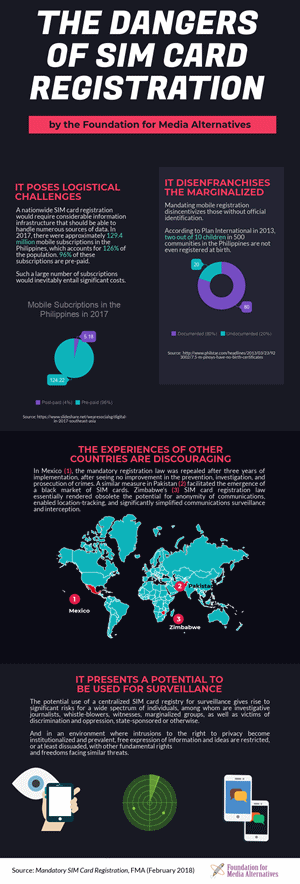Foundation for
Media Alternatives issues briefing paper on SIM card registration
Press Release
February 6, 2018
QUEZON CITY – With
efforts to establish a mandatory SIM card registration gaining steam
in Congress, the Foundation for Media Alternatives (FMA) released a
briefing paper on the subject this Monday, February 5, 2018.
 FMA is a civil society
organization whose aim is to assist civil society organizations and
other development stakeholders in promoting and defending their
right to information and communication.
FMA is a civil society
organization whose aim is to assist civil society organizations and
other development stakeholders in promoting and defending their
right to information and communication.
In its brief, the
organization presented an overview of the benefits and risks that
come with a SIM card registration system, as evidenced by the actual
experiences of other countries. It noted that the rationale behind
most SIM card registration policies is their supposed ability to
deter crime and terrorism, while at the same time increasing public
access to mobile-based government services. Something that is
inconsistent with the experiences of many jurisdictions that have
such a system. In a number of instances, its weakness in curbing
terrorism has been exposed due to the ability of criminals to
circumvent regulation. It even caused the emergence of black markets
where stolen or counterfeit SIM cards are sold, as well as an
increase in handset theft incidents, as demand for untraceable
phones spiked.
In the recent past,
concerns about its effectiveness have already been raised by local
stakeholders such as the Department of Information and
Communications Technology and the telecommunications industry. Even
the Office of the President of the previous administration had
occasion to express its doubts about the measure.
The briefing paper
highlights other issues surrounding the controversial measure, not
least of which is its potential use for surveillance against those
belonging to at-risk groups or sectors such as journalists,
whistleblowers, witnesses, and victims of discrimination and
oppression. Ultimately, it argues, an environment where intrusions
to privacy become institutionalized and prevalent, inevitably poses
a significant risk to other fundamental rights and freedoms, such as
free speech, freedom of assembly, and right to information, just to
name a few.
In conclusion, FMA
declares that the promise of SIM card registration to help law
enforcement and improve the delivery of government services has
already been revealed as illusory, or at least significantly
inflated. The group then enjoins the government to consider all
things – particularly the dangers posed by the proposal – before
rushing to pass a policy that can do more harm than good. For the
public, they need to remain vigilant and resist any or all measures
that attempt to narrow individual space for privacy and other
related rights and freedoms.